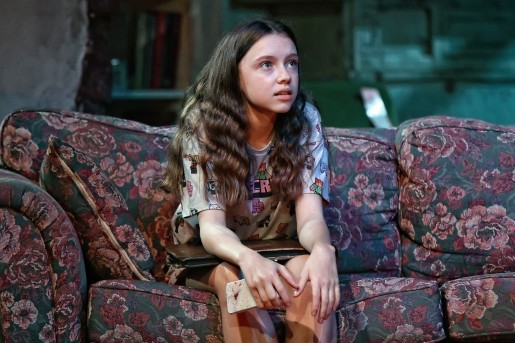Roslyn Packer Theatre, March 20
8.5/10
Branden Jacobs-Jenkins’ ferocious play ends with decay. The “romantic” plantation mansion in Arkansas we have shared with nine characters for nearly three hours begins to disintegrate in a string of fleeting scenes, rather like stop-frame photography. It’s as if the house, itself, is diseased, and on one level Appropriate seems to ask if a place can make people evil. But really only the play’s tinderbox of characters wonder this: Jacobs-Jenkins knows that people bring the evil all by themselves.

Like a jazz soloist quoting from extant tunes, Jacobs-Jenkins’ virtuosity draws on playwrights ranging from Chekhov to Tennessee Williams in depicting the Lafayettes as a chronically dysfunctional family. He could be seen as almost parodying his predecessors when Rachael exclaims, “Can we sit around being casually dysfunctional later, and focus for a second?” His motives are less frivolous, however. He seeks to twist a knife in the ribs of conventional family drama, point to the wound and say, “That’s the hole left by the missing piece in so many of these previous jigsaw puzzles: race.”
Ray Lafayette has died, leaving his children to dispose of a property not only encumbered with massive debt, but bursting with hoarded junk, including an album of photographs of lynched African Americans. The children don’t really care for implication that daddy was a racist, so other explanations are forthcoming – explanations that illuminate the children more than their father.

Mandy McElhinney heads the cast is as Toni, the big sister who is the axle around which her younger brothers revolve like spokes in a horse-drawn buggy. She is loud, brash, rude, embittered, seemingly armour-plated emotionally and as caustic as paint-remover. McElhinney tempers that astringency in a performance that stores up our sympathy against her worst behaviour and moral blind-spots, as when she insists that “all this stress over money is what’s destroying this family”.
She can be forgiven for being confused, because the middle sibling, Bo (Sam Worthington) is about as money-obsessed as any child of capitalism can be. Worthington, treading the boards for the first time in over two decades after a stellar film career, seemed somewhat nervous to start, but then just kept getting better at playing this grasper with a fuzzy veneer. By the third act his physical acting was riveting, the performance only compromised by lapses of vocal projection.
Johnny Carr excels as Franz, the younger brother, whose unsavoury past has estranged him from his siblings, and who has now come sniffing round the honey pot with his fiancee, River (Brenna Harding). A lesser playwright would have mercilessly lampooned River, with her new-age claptrap and inane positivism, but Jacobs-Jenkins rounds her out, and Harding does the rest, letting cracks into the facade of what Toni disparagingly calls “a sweet girl”.

Lucy Bell nails Rachael, Bo’s wife, who, while sharing Bo’s avidity, has an outsider’s perspective on the poison running through Lafayette veins, and so is blessed with many of the best lines. James Fraser eventually convinces as Toni’s wayward son, Rhys, and director Wesley Enoch (for STC) has assembled such an exceptionally balanced cast that even young Ella Jacob shines as Bo and Rachael’s knowing 13-year-old daughter Cassidy. Robbi Morgan plays her younger brother Ainsley, the centrepiece of a pivotal moment when he dons an old white hood…
Enoch fully ensnares us in this masterful play’s multi-layered complexity, his staging often creating shapes that almost ritualise the characters’ interrelationships, and Elizabeth Gadsby’s set is a ghost of spent splendour.
Until April 10.